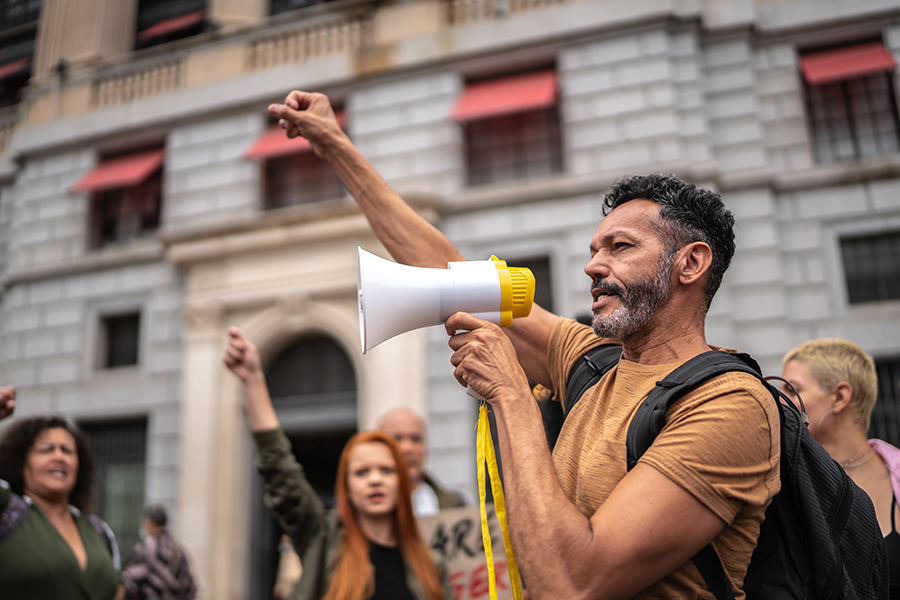Read original article on AP News.
UPS has reached a tentative contract agreement with its 340,000-person strong union, potentially averting a strike that threatened to disrupt logistics nationwide for businesses and households alike.
The agreement was announced after UPS and the Teamsters came back to the negotiating table on Tuesday, July 25, to talk over remaining sticking points in the largest private-sector contract in North America. Negotiators had already reached tentative agreements on a host of issues but remained at odds on contentious issues like pay for part-time workers who make up more than half of the UPS employees represented by the union.
The Teamsters called the tentative agreement “historic” and “overwhelmingly lucrative” in a prepared statement.
Under the tentative agreement, existing full- and part-time UPS union workers will get $2.75 more per hour in 2023, and $7.50 more per hour over the length of the five-year contract. The agreement also includes a provision to increase starting pay for part-time workers, which the union had called the most at risk in the company’s workforce of being exploited and cast aside. Starting pay for part-time workers will be $21 per hour, it said, up from $16.20 today. The average pay for part-timers had been $20, according to the union.
The two sides had already agreed tentatively to make Martin Luther King Jr. Day a full holiday for the first time, and ending forced overtime on drivers’ days off. Tentative agreements on safety issues had also been reached, including equipping more trucks with air conditioning. UPS agreed to add air conditioning to U.S. small delivery vehicles purchased after January 1, 2024.
They had also agreed to eliminate a lower-paid category of drivers who work shifts that include weekends, and convert them into regular full-time drivers.
“Together we reached a win-win-win agreement on the issues that are important to Teamsters leadership, our employees and to UPS and our customers,” Carol Tomé, UPS chief executive officer, said in a written statement. “This agreement continues to reward UPS’s full- and part-time employees with industry-leading pay and benefits while retaining the flexibility we need to stay competitive, serve our customers and keep our business strong.”
Voting on the new contract begins on Aug. 3 and concludes Aug. 22, 2023.
Union members, angered by a contract they say was forced on them five years ago by union leadership, clashed with UPS over pay as profits for the delivery company soared in recent years. Union leadership was upended last year with the election of Sean O’Brien, a vocal critic of the union president who signed off on that contract, James Hoffa, the son of the famous Teamsters firebrand.
Profits at UPS have grown more than 140% since the last contract was signed as the arrival of a deadly pandemic drastically transformed the manner in which households get what they need.
Unionized workers argued they were the ones shouldering growth at the Atlanta company and appeared dead set on righting what they saw as a bad contract.
The 24 million packages UPS ships on an average day amounts to about a quarter of all U.S. parcel volume, according to the global shipping and logistics firm Pitney Bowes. As UPS puts it, that’s the equivalent of about 6% of nation’s gross domestic product.
The last breakdown in labor talks a quarter century ago led to a 15-day walkout by 185,000 UPS workers that crippled the company. The company has less market share compared to then, but a walkout would have had far-reaching implications this time around with consumers more reliant on online shopping and speedy deliveries.
The consulting firm Anderson Economic Group said a 10-day UPS strike could have cost the U.S. economy more than $7 billion and trigger “significant and lasting harm” to small businesses, household workers and online retailers across the country.
Logistics experts had warned that all of the other shipping companies combined would not have had the capacity to handle all the packages that would flow their way during a work stoppage, and prices on shipping and goods would eventually increase. Customers who shop online could have faced more shipping fees and longer waits.
In recent weeks, large and small businesses worked to create contingency plans should there be a work stoppage at UPS.
Joseph Debicella, a small business owner who runs an online site that sells bridesmaid gifts, said his company ships roughly 50% of its orders through UPS. He hasn’t used FedEx before, but created an account with the company two weeks ago as chatter over a strike picked up. He was also hearing about the negotiations from his UPS driver, who told him his deliveries were getting lighter as the July 31 deadline for a new contract neared.
Debicella, who lives in Charlotte, North Carolina, says he’s been concerned about costs since he provides free shipping to customers who spend more than $99 on the site.
Macy’s CEO Jeff Gennette told The Associated Press that the department store chain was looking at contingency plans in case of a strike and that its supply chain team was mapping out what a strike would look like and how it would affect shipping.
The deal could prevent a major logistics disruption just as retailers were in the throes of the back-to-school shopping season, the second largest sales period behind the winter holidays.
The Retail Industry Leaders Association, a national retail trade group that counts retailers like Best Buy, CVS Health and Kohl’s as members, called the tentative pact “an enormous relief to retailers, who have been navigating the possibility of a strike and the associated uncertainty for weeks.”
“We’ve learned all too well over the last several years the impact supply chain disruptions can have,” the group said in a statement. ”We’re grateful that this challenge, which would have had a price tag in the billions of dollars and a long runway for recovery, was avoided.”
Labor experts saw the showdown as a demonstration of labor power at a time of low union membership in the U.S., union activity has grown rapidly this summer. Hollywood actors and screenwriters are picketing over pay issues. United Auto Workers are also talking about a potential strike.
This article was originally published on AP News.






















